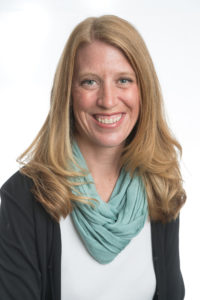Story by Sabrina Robinson

Colorado State University’s School of Education is pleased to recognize Assistant Professor Leann Kaiser, who was recently celebrated as an Online Innovative Educator. Granted by CSU Online once per semester, the award recognizes exceptional teaching in online classes.
“The OLIE is a student-nominated award that recognizes a faculty member who can establish positive relationships with students, who is responsive to and motivates students, and who provides insightful and interesting lectures and thought-provoking assignments,” said CSU Online Senior Communications Strategist Steve Gaisford. “The award is given to an individual who can do all of these things at a distance—something that presents its own challenges.”
Kaiser was honored to win the award, especially in the field she is passionate about: teaching online.
“I absolutely love it,” she said. “The research that I have done has been on online teaching, so it’s a pretty big honor that something I’ve spent a lot of time on and a lot of research on – apparently I’m doing an okay job at it!”
Bridging the distance
As an educator in online classes, Kaiser works very closely with her students despite the fact that she rarely meets them in person. Because there is no assigned time that the class meets online, Kaiser has worked to develop a relationship with each student through online discussions, emails, or Skype calls.
“If a student just feels like they’re on their own out there, submitting assignments, then they don’t really have any sort of discussion with other students and they don’t feel like they know the instructor,” said Kaiser. “I’s a pretty quick way for them not to care about the class, potentially drop out, or do the bare minimum.”
To avoid with this, Kaiser has made it part of her teaching philosophy to regularly contact a student throughout a semester. She also wants to ensure her students feel comfortable and respected in their relationship.
“I ensure that I, as an instructor, am a real person,” said Kaiser. “So I tell students right away ‘you can call me what you’re comfortable with – Leann, Dr. Kaiser, Professor’. It’s just those little things that show I’m not an unapproachable ivory tower.”
Diversity in the classroom
One of the advantages of online classes, Kaiser said, is the diversity of the students. While there are students who simply can’t make it to classes on campus, there are students enrolled that are located across Colorado, across the country, and across the world. The students also have diverse careers, which Kaiser has made a point to focus on.
“I really want to understand who all of these students are, what they need out of my class, and how I can best help them to do that,” she said. “We have people who are teaching English in a second language to immigrants coming to the U.S., firefighters teaching other firefighters, people at an insurance company teaching others how to do insurance. Some students are coaches and that’s teaching, too. It’s all over the place.”
The online setting of the class also provides an opportunity for students to participate in ways that are not always possible in an on-campus class. Online classes, said Kaiser, allow for contemplation and personal connections before contributing to the conversation. Students who don’t like speaking “on the fly” have the time they need to gather their thoughts before speaking.
“There’s so much more depth that can come online, because everyone has time to think about what they want to say and what they’re going to put forward,” she said. “In an on-campus class you say, ‘Oh I read this really cool article; let me tell you about it’ but in an online class, you post that article. We can all see it; we can all engage with it.”
Passion for teaching
Kaiser’s continued work and research is driven by her passion for teaching online
“I’m not just teaching my topic,” she said, “I do what I teach. I am teaching people how to teach, and at the same time, I’m teaching myself.”
Kaiser’s research has helped her teaching evolve as well. As she learns from literature and research published by others, and from her own ongoing research, she learns how to improve and apply new concepts to her own teaching. The results are seen in the student response to her classes.
“I think, in terms of a teaching award, students are the ones who know the most about how we’re doing and if we’re not doing things well,” she said. “So I think that’s a great honor to have students be able to call that out.”
The School of Education is part of CSU’s College of Health and Human Sciences.